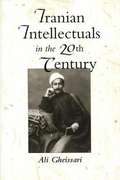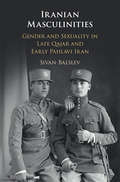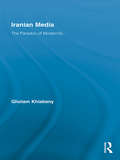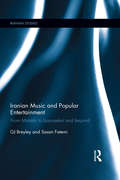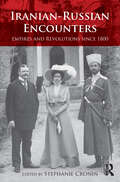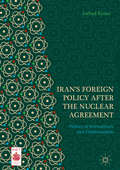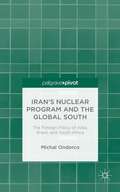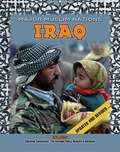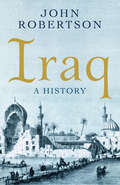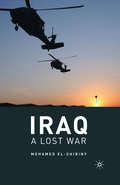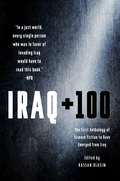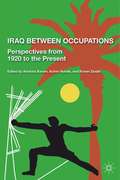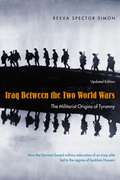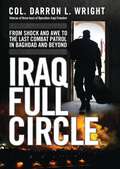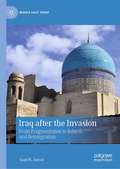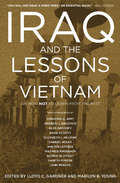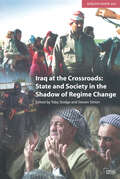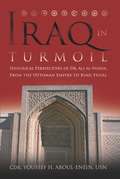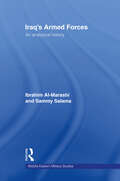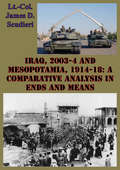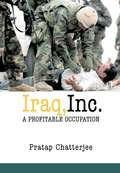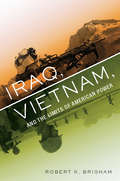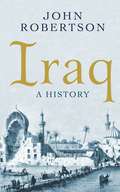- Table View
- List View
Iranian Intellectuals in the 20th Century
by Ali GheissariSince the middle of the nineteenth century, Iranian intellectuals have been preoccupied by issues of political and social reform, Iran's relation with the modern West, and autocracy, or arbitrary rule. Drawing from a close reading of a broad array of primary sources, this book offers a thematic account of the Iranian intelligentsia from the Constitutional movement of 1905 to the post-1979 revolution. Ali Gheissari shows how in Iran, as in many other countries, intellectuals have been the prime mediators between the forces of tradition and modernity and have contributed significantly to the formation of the modern Iranian self image. His analysis of intellectuals' response to a number of fundamental questions, such as nationalism, identity, and the relation between Islam and modern politics, sheds new light on the factors that led to the Iranian Revolution--the twentieth century's first major departure from Western political ideals--and helps explain the complexities surrounding the reception of Western ideologies in the Middle East.
Iranian Masculinities: Gender and Sexuality in Late Qajar and Early Pahlavi Iran
by Sivan BalslevThe transition from Qajar rule in Iran (c.1789–1925) to that of rule by the Pahlavi dynasty (1925–1979) set in motion a number of shifts in the political, social, and cultural realms. Focusing on masculinity in Iran, this book interweaves ideas and perceptions, laws, political movements, and men's practices to spotlight the role men as gendered subjects played in Iranian history. It shows how men under the reign of Reza Shah dressed, acted, spoke, and thought differently from their late Qajar period counterparts. Furthermore, it highlights how the notion of being a "proper Iranian man" changed over these decades. Demonstrating how an emerging elite of western-educated men constructed and promoted a new model of masculinity as part of their struggle for political, social, and cultural hegemony, Balslev shows how this new model reflects wider developments in Iranian society at the time including the rise of Iranian nationalism and the country's modernisation process.
Iranian Media: The Paradox of Modernity (Routledge Advances in Internationalizing Media Studies)
by Gholam KhiabanyThe post-revolutionary state in Iran has tried to amalgamate ‘Sharia with electricity’ and modernity with what it considers as ‘Islam’. While sympathetic to private capital, through quasi anti-capitalist politics, the state began to restrict market-relations, confiscate major assets of sections of the Iranian bourgeoisie, and nationalize major aspects of Iran’s industry, including its communications system. Since the end of war with Iraq and the start of the process of ‘reconstruction’, market-driven development and economic policies have been key aims of the state.
Iranian Music and Popular Entertainment: From Motrebi to Losanjelesi and Beyond (Iranian Studies)
by Sasan Fatemi Gj BreyleyThe word motreb finds its roots in the Arabic verb taraba, meaning 'to make happy.' Originally denoting all musicians in Iran, motrebi came to be associated, pejoratively, with the cheerful vulgarity of the lowbrow entertainer. In Iranian Music and Popular Entertainment, GJ Breyley and Sasan Fatemi examine the historically overlooked motrebi milieu, with its marginalized characters, from luti to gardan koloft and mashti, as well as the tenacity of motreb who continued their careers against all odds. They then turn to losanjelesi, the most pervasive form of Iranian popular music that developed as motrebi declined, and related musical forms in Iran and its diasporic popular cultural centre, Los Angeles. For the first time in English, the book makes available musical transcriptions, analysis and lyrics that illustrate the complexities of this history. As it presents the findings of the authors' years of ethnographic work with the history's protagonists, from senior motreb to pop-rock stars, the book reveals parallels between the decline of motrebi and the rise of 'modernity.' In the twentieth century, the fate of Tehran's motrebi music was shaped by the social and urban polarization that ensued from the modern market economy, and losanjelesi would be similarly affected by transnational relations, revolution, war and migration. Through its detailed and informed examination of Iranian popular music, this study reveals much about the values and anxieties of Iranian society, and is a valuable resource for students and scholars of Iranian society and history.
Iranian-Russian Encounters: Empires and Revolutions since 1800 (Iranian Studies)
by Stephanie CroninOver the past two hundred years, encounters between Iran and Russia have been both rich and complex. This book explores the myriad dimensions of the Iranian-Russian encounter during a dramatic period which saw both Iran and Russia subject to revolutionary upheavals and transformed from multinational dynastic empires typical of the nineteenth century to modernizing, authoritarian states typical of the twentieth. The collection provides a fresh perspective on traditional preoccupations of international relations: wars and diplomacy, the hostility of opposing nationalisms, the Russian imperial menace in the nineteenth century and the Soviet threat in the twentieth. Going beyond the traditional, this book examines subaltern as well as elite relations and combines a cultural, social and intellectual dimension with the political and diplomatic. In doing so the book seeks to construct a new discourse which contests the notion of an implacable enmity between Iran and Russia Bringing together leading scholars in the field, this book demonstrates extensive use of family archives, Iranian, Russian and Caucasian travelogues and memoirs, and newly available archives in both Iran and the countries of the former Soviet Union. Providing essential background to current international tensions, this book will be of particular use to students and scholars with an interest in the Middle East and Russia.
Iran’s Foreign Policy After the Nuclear Agreement: Politics Of Normalizers And Traditionalists (Middle East Today Series)
by Farhad RezaeiThe book offers the first systematic account of Iran’s foreign policy following the nuclear agreement (JCPOA) of July 14, 2015. The author evaluates in what ways the JCPOA, in conjunction with the dramatic changes taking shape in the international order, have affected Iran’s foreign policy. Known as Normalizers, the moderate leadership under President Hassan Rouhani had planned to normalize Iran’s foreign relations by curtailing terrorism and reintegrate Iran into the community of nations. Their hardline opponents, the Principalists, rejected the JCPOA as a tool of subjection to the West and insisted on exporting the Islamist revolution, a source of much destabilization and terror in the region and beyond. The project also analyzes the struggle between Normalizers and their hardline opponents with regards to global and regional issues and Iran’s foreign policy towards global powers including the U.S., Russia, EU, and regional countries including Iraq, Syria, Israel, Saudi Arabia and Turkey.
Iran’s Nuclear Program and the Global South: The Foreign Policy Of India, Brazil, And South Africa
by Michal OndercoThis book studies the reactions of India, Brazil, and South Africa the three main non-proliferation actors of the Global South to Iran's nuclear program. Their responses are explained and situated in wider foreign policy context.
Iraq
by Bill ThompsonIn the spring of 2003, the United States and it allies invaded Iraq to remove one of the world's most brutal dictators, Saddam Hussein, from power. But when the Hussein regime fell, Iraqis wondered whether their country would hold together, or if it would disintegrate under the force of long-standing ethnic and religious rivalries. The international community also watched closely. With the world's second-largest proven oil reserves, Iraq holds great economic importance for an energy-hungry globe. As one of the largest Arab states, Iraq is politically important in the Middle East region as well. Some American policymakers believed that with Saddam gone, Iraq could become an example of democracy and progress for the other Arab states. However, a period of sectarian violence prevented that from the occurring. Despite the conflict, Iraqis took steps toward developing a parliamentary democracy, approving a constitution in October 2005 and holding several subsequent elections for government officials. In addition, new military strategies have significantly reduced the level of violence. While the future remains uncertain, Iraqis hope their country is on a path to peace and promise. Discusses the geography, history, economy, government, religion, people, foreign relations, and major cities of Iraq.
Iraq
by John RobertsonIn this insightful analysis, highly-respected expert John Robertson canvases the entirety of Iraq's rich history, from the seminal advances of its Neolithic inhabitants to the aftermath of the American-led invasion and Iraq today. Grounded in extensive research, this balanced account of a country and its people explores the greatness and grandeur of Iraq's achievements, the brutality and magnificence of its ancient empires, its contributions to the emergence of the world's enduring monotheistic faiths, and the role the great Arab caliphs of Baghdad played in the medieval cultural flowering that contributed so much to the European Renaissance and the eventual rise of the West.Fascinating and thought-provoking, Robertson's work sheds light on a remarkable story of world history, one that has been too often overlooked. Wide-ranging and extensive in approach, it is sure to be greatly appreciated by historians, students and all those with an interest in this diverse and enigmatic country.
Iraq
by Mohamed El-ShibinyIraq: A Lost War deals with the impact of September 11th on the occupation of Iraq and the U. S. declaration of war on international terrorism. It investigates whether war in Iraq was morally justified and whether coalition forces capturing and hanging its president were morally and legally acceptable internationally.
Iraq + 100: The First Anthology of Science Fiction to Have Emerged from Iraq
by Hassan BlasimA groundbreaking anthology of science fiction from Iraq that will challenge your perception of what it means to be “The Other”“History is a hostage, but it will bite through the gag you tie around its mouth, bite through and still be heard.”—Operation DanielIn a calm and serene world, one has the luxury of imagining what the future might look like.Now try to imagine that future when your way of life has been devastated by forces beyond your control.Iraq + 100 poses a question to Iraqi writers (those who still live in that nation, and those who have joined the worldwide diaspora): What might your home country look like in the year 2103, a century after a disastrous foreign invasion?Using science fiction, allegory, and magical realism to challenge the perception of what it means to be “The Other”, this groundbreaking anthology edited by Hassan Blasim contains stories that are heartbreakingly surreal, and yet utterly recognizable to the human experience. Though born out of exhaustion, fear, and despair, these stories are also fueled by themes of love, family, and endurance, and woven through with a delicate thread of hope for the future.At the Publisher's request, this title is being sold without Digital Rights Management Software (DRM) applied.
Iraq Between Occupations
by Achim Rohde Amatzia Baram Ronen ZeidelThis edited volume represents a re-examination of the most central issues in the history of the Iraqi nation state until the American occupation (1920-2003) and, in the light of that history, a re-evaluation of developments under the occupation (2003-2008).
Iraq Between the Two World Wars: The Militarist Origins of Tyranny
by Reeva Spector SimonWhy did a group from the Iraqi army seize control of the government and wage a disastrous war against Great Britain, rejecting British and liberal values for those of a militaristic Germany? What impact did these actions have on the thirty-year regime of Saddam Hussein?Departing from previous studies explaining modern Iraqi history in terms of class theory, Reeva Simon shows that cultural and ideological factors played an equal, if not more important, role in shaping events. In 1921 the British created Iraq, and an entourage of ex-Ottoman army officers, the Sharifians, became the new ruling elite. Simon contends that this elite, returning to an Iraq made up of different ethnic, religious, and social groups, had to weld these disparate elements into a nation. Pan-Arabism was to be the new ideological source of unity and loyalty. Schools and the army became the means through which to implant it, and a series of military coups gave the officers the chance to act in its name. The result was an abortive revolt against Britain in 1941. And the legacy of the revolt is still apparent in the next two generations of Iraqi officers that led to the regime of Saddam Hussein.This updated edition locates the sources of Iraqi nationalism in the experience of these ex-Ottoman army officers who used the emergent pan-Arabism to weld a disparate population into a nation. Simon shows that the relationships forged between Iraqi officers and Germans in Istanbul before WWI left deep legacies that go a long way toward explaining the disastrous war against Great Britain in 1941, the rejection of liberal values, the revolution of 1958 in which the military finally seized power, and the outlook of the leadership recently overthrown by American and British armies.
Iraq Full Circle
by Darron WrightCol. Wright served three tours of duty in the Iraq War, commanding the last active combat brigade to withdraw from Operation Iraqi Freedom. His book personalizes the broader operational conflict we've all heard so much about, giving us a previously unknown insider command perspective that will fundamentally change how our nation thinks of the war. For Col Wright, the Iraq war was a good war fought well. In his new book, Iraq Full Circle, he offers a first-hand assessment of the US Army's eight year war in Iraq.As battalion operations officer for an infantry battalion from 2003-2004 operating in the dangerous and volatile Sunni Triangle, followed by a tour of duty as a Brigade Executive Officer from 2005-2006 in Baghdad, Wright witnessed some of the harshest fighting seen during the war. He saw the evolution from 'shock and awe' to the 'clear-hold-build' strategy during the height of sectarian violence and was on-hand for the transition to COIN followed by the handover of security operations to the Iraqi Security Forces. In August 2010, Wright, as a deputy brigade commander, was among the last combat soldiers to leave Iraq as part of President Obama's draw-down of troops.While Wright does not hesitate to criticize the political and military leadership that failed to foresee the insurgency, or the errors in judgment that led to the dismantling of the Iraqi Army in 2003, his overall assessment of the war is that the US Army achieved what it was asked to do by two Presidents. Calling upon his experience--and the examination of thousands of after action reports, combat operations orders, and over 100 interviews--Wright pieces together a compelling and cohesive narrative of the war. Readers will be surprised to learn:· Wright had a strong hunch beginning in September 2001 that he would be deployed to Iraq; he and his fellow Army leaders began preparing for an invasion soon after the 9/11 attacks.· Army leaders were already implementing much of the COIN doctrine in 2004 and 2005, well before the official change in doctrine and the publication of the new field manual on COIN.· For Wright and most other leaders at his level, President Bush's troop "surge" in November 2006 was completely uncontroversial and utterly inevitable. They knew that clear-hold-build was the right strategy and would work but that they did not have enough troops to make it stick.In his closing chapters, Wright discusses the growth and evolution of the Iraqi Security Forces, from an abjectly corrupt and militarily useless cohort in 2004 to a well-trained and stable entity capable of securing Iraq and providing for (mostly) safe and open national elections in 2010. He finishes his narrative with his thoughts on the future of Iraq, understanding that sectarian divisions persist, but that the Iraqi Security Forces have been well-trained by the US Army to secure Iraq's future.From the Hardcover edition.
Iraq after the Invasion: From Fragmentation to Rebirth and Reintegration (Middle East Today)
by Saad N. JawadThis book states that one calamitous result of the invasion and occupation of Iraq (2003) was the dismantling of the state and the destruction of all the structures and processes of government. The invading powers, the USA and UK, were obsessed with the removal of the regime of Saddam Hussein, which they regarded a clear danger and a serious threat to their strategies designs and in the region. To justify their atrocity, they trumped up a number of falsehoods and charges, such as the issue of WMD. Before that and over a period of 13 years, they had imposed unprecedented, fierce and relentless sanctions on the country. These sanctions not only impoverished and aggrieved the people of Iraq, but also instilled and deeply etched a sense of pessimistic impassivity among many Iraqis in that they felt no longer cared whatever the future might hold for them. The regime’s totalitarian nature also helped in creating this attitude. To add insult to injury, the provisional US-installed administration passed many resolutions which have had catastrophic consequences, such as the total dissolution of the security and armed forces and the de-baathification law. The hurriedly contrived new constitution confounded the situation even further and negatively impacted the integrity of the state. Exploiting the inconclusiveness and ambiguities contained in it, the Iraqi Kurdish Region became a de facto independent entity. In time, the central government became weaker than the regions. The hardest hit in this chaotic state of affairs was national unity. The sectarian and ethnic quota-based policies followed by the occupying forces and the expatriate Iraqis who came along with them dealt successive blows to the laws and institutions of the land which further disintegrated the Iraqi state. Iraq now is in dire need of national reconciliation programme aimed at re-uniting the people and the country.
Iraq and the Lessons of Vietnam: Or, How Not to Learn from the Past
by John Prados Andrew J. Bacevich Christian G. Appy David Elliott Gabriel Kolko Alex Danchev Wilfried Mausbach Walter LaFeber Alfred W. McCoy Gareth Porter Elizabeth L. HillmanEssays by Christian G. Appy, Andrew J. Bacevich, John Prados, and others offer &“history at its best, meaning, at its most useful.&” —Howard Zinn From the launch of the &“Shock and Awe&” invasion in March 2003 through President George W. Bush&’s declaration of &“Mission Accomplished&” two months later, the war in Iraq was meant to demonstrate definitively that the United States had learned the lessons of Vietnam. This new book makes clear that something closer to the opposite is true—that US foreign policy makers have learned little from the past, even as they have been obsessed with the &“Vietnam Syndrome.&” Iraq and the Lessons of Vietnam brings together the country&’s leading historians of the Vietnam experience. Examining the profound changes that have occurred in the country and the military since the Vietnam War, this book assembles a distinguished group to consider how America found itself once again in the midst of a quagmire—and the continuing debate about the purpose and exercise of American power. Also includes contributions from: Alex Danchev * David Elliott * Elizabeth L. Hillman * Gabriel Kolko * Walter LaFeber * Wilfried Mausbach * Alfred W. McCoy * Gareth Porter &“Essential.&” —Bill Moyers
Iraq at the Crossroads: State and Society in the Shadow of Regime Change (Adelphi series #354)
by Steven Simon Toby DodgeA war against Iraq will spur radical changes in the way the country is governed, how its people live, and its relationship to its neighbours and to the West. This book depicts the evolution of Iraq under Saddam Hussein, and describes each side's battle plan and the war's likely aftermath.
Iraq in Turmoil
by Youssef H., Aboul-EneinThis is a unique collection of essays highlighting Iraq's social, political and military history from a purely Iraqi perspective. Dr. Ali al-Wardi (1913-1995) attended the American University of Beirut in 1943 and then traveled to the United States to attain his Masters and Doctorate degrees in Sociology at the University of Texas in 1948 and 1950 respectively. He would return to Iraq and spend a career teaching, however his main legacy is a multi-volume work in Arabic that began to be published in late 1951 and ended in the early 1970s with his eighth book. It is a two decade work that highlights the history of Iraq from the arrival of the Ottomans to the monarchy of King Feisal I in 1925. Wardi's volumes are read by a wide variety of Iraqi society, and this volume is an introduction to this pivotal Arabic work to English readers. It brings alive how the Ottomans, British and Safavid Persians dealt with sectarianism in Iraq and the battles fought over key areas of Iraq. It is required reading for those with an interest in or who are deploying to Iraq. Wardi's work also discusses the dynamics of the 1920 Revolt, a year long insurgency against the British that was only satisified when London engineered a political solution to its advantage. That solution became the imposition of a monarchy under King Feisal of Iraq, who was not Iraqi. The monarchy would topple in 1958 and see the rise of Baathism.
Iraq in Wartime
by Dina Rizk KhouryWhen US-led forces invaded Iraq in 2003, they occupied a country that had been at war for 23 years. Yet in their attempts to understand Iraqi society and history, few policy makers, analysts and journalists took into account the profound impact that Iraq's long engagement with war had on the Iraqis' everyday engagement with politics, the business of managing their daily lives, and their cultural imagination. Drawing on government documents and interviews, Dina Rizk Khoury traces the political, social and cultural processes of the normalization of war in Iraq during the last twenty-three years of Ba'thist rule. Khoury argues that war was a form of everyday bureaucratic governance and examines the Iraqi government's policies of creating consent, managing resistance and religious diversity, and shaping public culture. Coming on the tenth anniversary of the US-led invasion of Iraq, this book tells a multilayered story of a society in which war has become the norm.
Iraq's Armed Forces: An Analytical History (Middle Eastern Military Studies)
by Ibrahim Al-Marashi Sammy SalamaThis book provides the first comprehensive study of the evolution of the Iraqi military from the British mandate era to post-Baathist Iraq. Ethnic and sectarian turmoil is endemic to Iraq, and its armed forces have been intertwined with its political affairs since their creation. This study illustrates how the relationship between the military and
Iraq, 2003-4 And Mesopotamia, 1914-18: A Comparative Analysis In Ends And Means
by Lieutenant Colonel James D. ScudieriThis paper is a comparative analysis of the British campaign in Mesopotamia during the First World War, 1914-18 and the current campaign in Iraq, 2003-4. The study focuses on an examination of Phase III decisive operations and Phase IV reconstruction operations, including strategic imperatives, operational planning, and the impact of changes during operations. The British had no campaign plan for Mesopotamia upon the outbreak of war in 1914. Deployment to this theater began as a peripheral operation. Overriding politico-strategic requirements spurred further exploitation to reach Baghdad. Failure to match ends and means resulted in the disastrous surrender of a division at Kut on 29 April 1916. Sweeping reorganization and large-scale reinforcements resumed the advance; Baghdad fell on 11 March 1917. The British conducted ad-hoc reconstruction operations throughout this period, beginning in the Basra vilayet and expanding their scope with the capture of Baghdad. The British established viable civil institutions, to include police forces, a functioning legal system, Revenue and Customs Departments, a banking system, and even domestic mail.Conversely, the recent U.S. strategy of pre-emption in Iraq was a policy decision based upon the wider strategic perspective and benefited from exhaustive operational planning. However, the rolling start campaign utilized minimal forces. They had the capability to win the decisive operations phase rapidly, but this same troop level was woefully inadequate to conduct incompletely-planned, sorely under-estimated, post-conflict operations. Both campaigns suffered from a serious mismatch of ends and means at certain stages, especially for post-war reconstruction operations. They achieved significant success due to herculean efforts in theater. The study concludes with recommendations for strategic leaders related to planning and force structure.
Iraq, Inc.: A Profitable Occupation (Open Media Series)
by Pratap ChatterjeeMore than one year after the "fall of Baghdad," the reconstruction of Iraq was failing terribly. Ordinary Iraqis waited in line for basic necessities like clean water and fuel, while the number of civilians and soldiers killed escalated in tandem with the billions of U.S. tax dollars spent. In Iraq, Inc.: A Profitable Occupation, Pratap Chatterjee delivers an on-the-ground account of the occupation business, exposing private contractors as the only winners in this war.Chatterjee examines the big failings and even bigger swindles of Iraq's corporate managers, from the dangerous follies of an out-of-touch government-in-exile to the unchecked price gouging by Cheney's successors at Halliburton. In Iraq, Inc. Chatterjee contrasts the employment boom of mercenaries--more than 20,000 soldiers of fortune from apartheid-era South Africa, Pinochet's Chile, and elsewhere in Iraq--with the crowds of unemployed locals ripe for recruitment to the resistance.Drawing on years of research and first-hand experience in the region including his live reporting from post-invasion Iraq as he traveled around the country first in December 2003 when Saddam Hussein was captured and in April 2004 during the height of the siege of Fallujah, Chatterjee brings us the dilapidated hospitals, looted ministries, and guarded corporate enclaves that mark the plunderous road to America's free Iraq.
Iraq, Lies, Cover-ups, & Consequences
by Rodney Stichauthor alleges corruption and lies by all three branches of US government support Iraq war after September 11.
Iraq, Vietnam, and the Limits of American Power
by Robert K. BrighamSince the first days of the Iraqi invasion, supporters of the war have cautioned the public not to view this conflict as another Vietnam. They rightfully point to many important distinctions. There is no unified resistance in Iraq. No political or religious leader has been able to galvanize opposition to U.S. intervention the way that Ho Chi Minh did in Vietnam. And it is not likely that 580,000 American troops will find their way to Iraq. However, there are two similarities that may dwarf the thousands of differences. First, in Iraq, like Vietnam, the original rationale for going to war has been discredited and public support has dwindled. Second, in both cases the new justification became building stable societies. There are enormous pitfalls in America's nation building efforts in Iraq as there were in Vietnam. But it is the business we now find ourselves in, and there is no easy retreat from it morally. As American frustration increases, some policy makers are making the deadly mistake of approaching problems in Iraq as if we are facing them for the first time. It is crucial that we apply the lessons of Vietnam wisely and selectively.
Iraq: A History (Short Histories)
by John RobertsonIn this insightful analysis, highly-respected expert John Robertson canvases the entirety of Iraq’s rich history, from the seminal advances of its Neolithic inhabitants to the aftermath of the American-led invasion and Iraq today. Grounded in extensive research, this balanced account of a country and its people explores the greatness and grandeur of Iraq’s achievements, the brutality and magnificence of its ancient empires, its contributions to the emergence of the world’s enduring monotheistic faiths, and the role the great Arab caliphs of Baghdad played in the medieval cultural flowering that contributed so much to the European Renaissance and the eventual rise of the West. Fascinating and thought-provoking, Robertson’s work sheds light on a remarkable story of world history, one that has been too often overlooked. Wide-ranging and extensive in approach, it is sure to be greatly appreciated by historians, students and all those with an interest in this diverse and enigmatic country.
